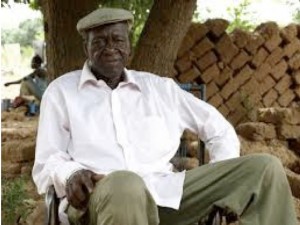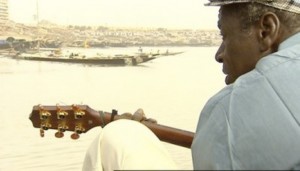
 This week’s Musical Dispatch is from Africa, Mali to be more precise. Boubacar Traoré is a renowned singer, songwriter, and guitarist. Traoré also goes by the nickname Kar Kar, “the one who dribbles too much” in Bambara, a reference to his soccer playing: “a nickname I got from playing soccer when I was young.
This week’s Musical Dispatch is from Africa, Mali to be more precise. Boubacar Traoré is a renowned singer, songwriter, and guitarist. Traoré also goes by the nickname Kar Kar, “the one who dribbles too much” in Bambara, a reference to his soccer playing: “a nickname I got from playing soccer when I was young.
This story comes from Lieve Joris’ “Mali Blues” 1996. Lieve spent time with Kar whilst researching this book. They were together in Kar’s birth town, Kayes, Mali, looking at the compound where there were a number of French colonial railway houses.
He (Kar, Boubacar Traoré), came here often with his friends; one of them would act as lookout while the others climbed over the wall to steal fruit. That’s how they found out about white people’s cats. Fat, lazy animals, not like the strays in their neighbourhoods that could only be caught and put in the pan after an intensive round-up.
“You ate cat?”
“You bet! Our mothers were more than happy to lend us a pan when we’d caught one, because cat meat is good for children: it makes them limber and protects them against evil spirits. Why else would they use so many cats for gris-gris? The skin of a black cat is particularly powerful. Too bad old people take those kinds of secrets to their graves, just because they can’t find anyone worthy of passing them on to.”
The tame cats in the white people’s gardens caught their fancy, and it wasn’t long before one after the other began disappearing. Kar sees me shudder and laughs. “They had so much meat on them that we had no appetite left when evening came around. Oh, they were so tender. Especially the haunches.”
“Did your mothers know where those cats came from?”
“No, we didn’t tell them that. My mother wouldn’t have put up with it; my father worked for a white man.”
Kar’s story made me queasy at first, but now I’m starting to feel a bit of unholy glee. My white acquaintances’ cats in Bamako (the capital of Mali, in the south of the country, on the River Niger; pop. est 1.7 mil 2009) eat meat their young servants could never afford, and the memory of the Amsterdam animal ambulance racing up to rescue a cat that had almost been asphyxiated by a fire in my neighbourhood still makes me uneasy. That Kar and his friends dared to wring the necks of those lethargic symbols of Western wellbeing!
“The cat that belonged to the gendarmerie was the fattest of all,” Kar says, “but also the hardest to catch. It sat on the commander’s windowsill all day, purring. we lurked around for weeks, whistling, hissing, meowing, trying a thousand different tricks, but there was no way to get it to move. Until Mani, the biggest rascal in our group, came up with the idea of asking the butcher for some leftovers. We fried that up into a real tasty meal and used it to lure the cat down off the windowsill. Then we threw a net over it and raced away. While we were running, Mani kept yelling: ‘I get the butt!’ “
“You were a bunch of scoundrels!”
“We certainly were. Sometimes we’d walk past the villa in question the next day and see the lady of the house wandering around with tears in her eyes. As if there’d been a death in the family! even the commander of the gendarmerie was out of sorts for days after his cat disappeared.” Sounding chastened, he adds: “when you’re young, you don’t think about the suffering yu cause others. Only God can forgive us for what we did back then.”
Now listen to Kar Kar here http://www.youtube.com/watch?v=X4uJP6atMP8
and again here http://www.youtube.com/watch?v=ZsjQ0-QIWks
